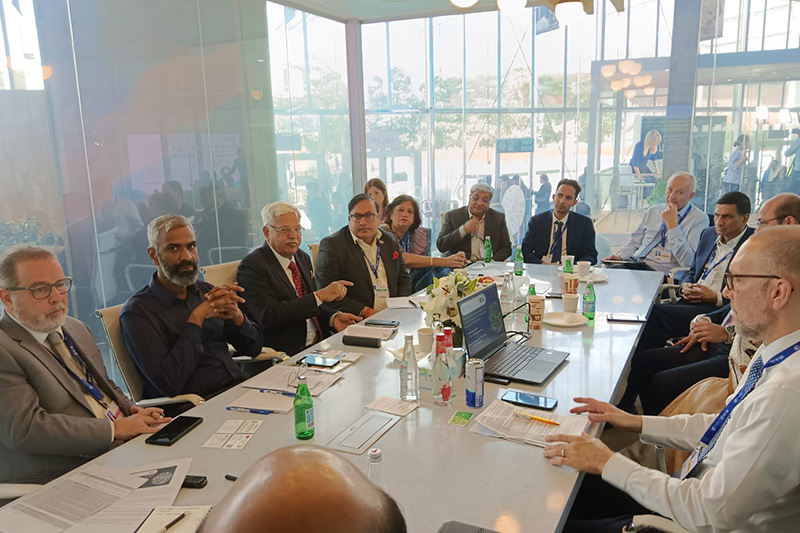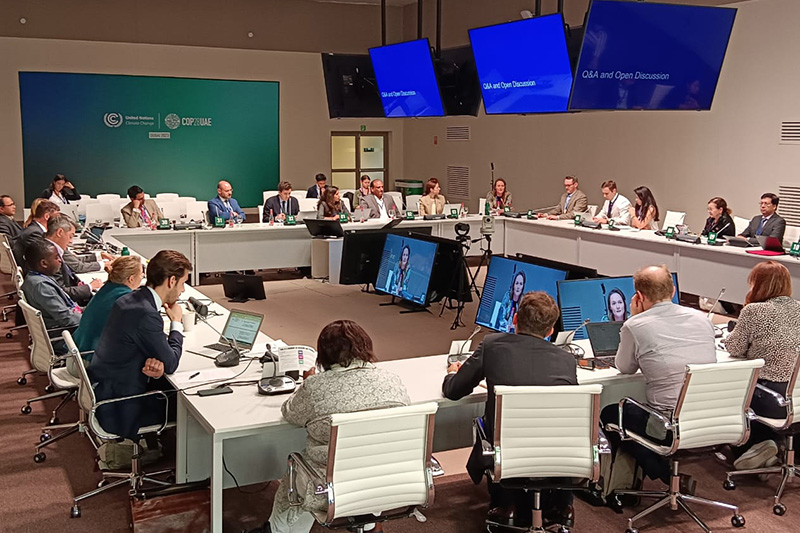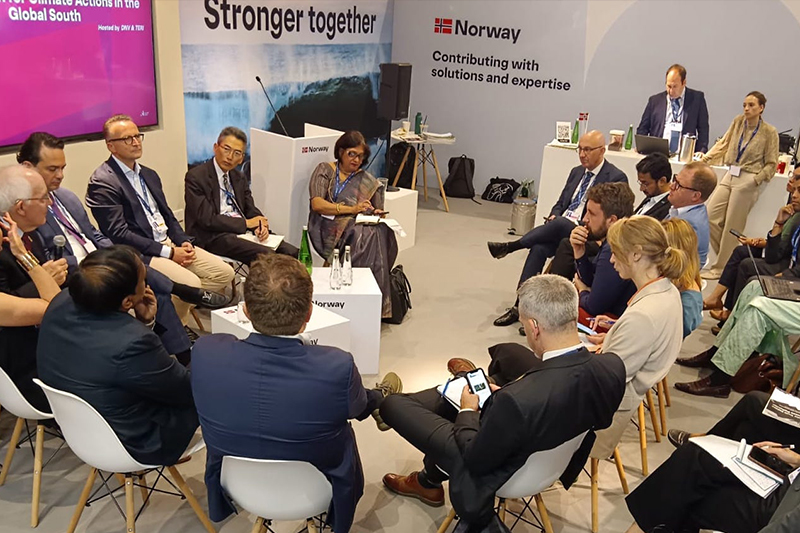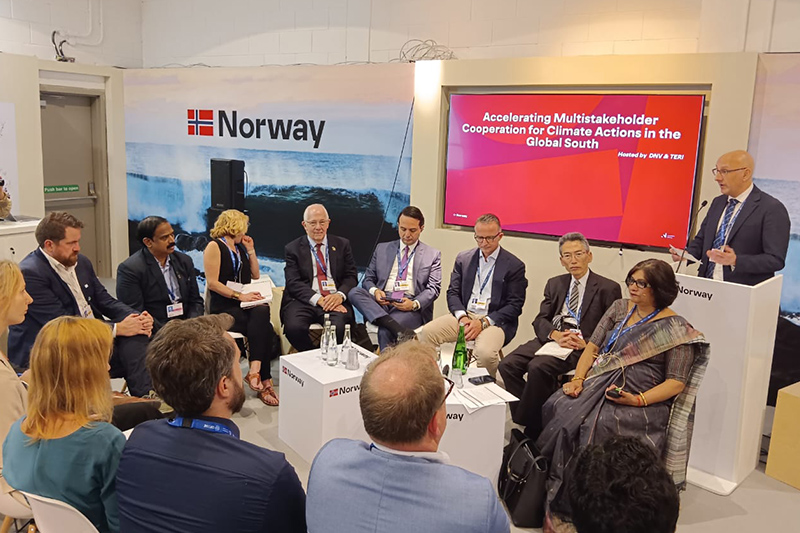Reports
Navigating Discussions on Decarbonisation and Business Actions at COP28

The COP28 at Dubai will be recognized for its agreement to set up the loss and damage fund. With the conference agreeing to transition away from fossil fuels, there is a need for stakeholders to act on their pledges, as shared by Simon Stiell, UN Climate Change Executive Secretary in his closing remarks, “… all governments and businesses need to turn these pledges into real-economy outcomes, without delay”.
Industrial Deep Decarbonisation
Implementing transformative actions on climate change requires an equally transformative business leadership.
For developing and emerging countries like India, international cooperation ought to strengthen with costs of climate action being abated through carbon markets. Increasing energy demand across the landscape of emerging economies will necessitate the use renewable energy; making such a transition just and inclusive will require skilling and investing in R&D.
Such were the recommendations that emerged out of a panel discussion co-organised by TERI and BCG India on ‘Transformative Climate Leadership for Actions on Finance, Technology and International Cooperation’. Panellists at the discussion recognized the power of collective action, with capital markets and private equity players demonstrating their affinity to increasingly consider ESG parameters to evaluate their investment portfolios.
Transformative climate leadership needs to be backed by transformative actions. However, the world continues to lag behind. “Emissions need to reduce by 43% between now and 2030 for the world to be on track to achieve the 1.50C temperature goal set under the Paris Agreement”, shared Professor Jim Skea, chair of the Intergovernmental Panel on Climate Change (IPCC).
Professor Skea shared these observations at a panel discussion with Indian business leaders where he discussed the findings of the IPCC Sixth Assessment Report and its implications for India. The panel discussion saw the launch of the report ‘Practices and Solutions: Accelerating Indian Industry Decarbonisation’. The report, a compilation of case studies of the signatory companies to the Industry Charter for Near Zero Emissions, highlights successful integration and piloting of green technologies by leading Indian industry players.
Observing that while net zero globally does not mean that every sector and every actor need to be become net zero simultaneously, some specific sectors on the energy demand side such as industry and transportation will need to rely on carbon removals and upcoming technologies such as carbon capture, usage and storage to reach their decarbonisation goals.
With challenges, however, come opportunities; Professor Skea highlighted that the price of renewable electricity generation has become competitive, with solar energy and battery storage systems witnessing an 85% decline in price in the past decade.
Outlook of Deep Decarbonisation in the Indian Context
Sharing their perspectives on India’s decarbonisation trajectory, industry business leaders shared their set of challenges with the transition requirements. Foremost among these is the inability to ensure Round – The – Clock (RTC) green power, with batter storage systems continuing to demand high capex. Simultaneously, though, India’s decarbonisation journey also presents businesses with opportunities to leverage. Fuel switching has emerged as a key pillar for the industry to reduce its emissions. Apart from focusing on Scope 1 and 2 emissions, companies are also leveraging new technologies and business models to reduce their Scope 3 emissions. Many are focusing on electrifying their transport fleets to reduce emissions. Indeed, climate actions also provide linkages with SDGs. Electric vehicles offer the chance of not just emission reduction, but also reduce air pollution, helping improve human health.
Public Policy as a Pivotal Element of Decarbonisation
Role of public policy in lending industries a helping hand on their decarbonisation journey will help in the long term. Upcoming regulatory frameworks such as carbon market in India, and carbon pricing are key policies that will push industries toward emission reduction targets. Public policy as an instrument for leading forth decarbonisation also emerged from another COP28 session. ‘Green Market Instruments for Industry Decarbonisation – Spotlight on Steel in Emerging Economies’ co-organised by TERI with Climate Catalyst and Mission Possible Partnership at the Marrakech Partnership Pavilion on 5th December, the thematic day on ‘Energy and Industry’, saw leaders across the steel sector share their perspectives on the demand and supply side instruments that can help produce low-carbon steel. Ensuring a practical implementation of low-carbon steel market will require several actions to be undertaken simultaneously, like - ensuring bankability of projects; government procurement of green steel; risk absorption; contract standardization, and willingness to pay green premium.
Given that India’s demand for steel is expected to reach 350 million tonnes by 2050, two crucial factors can help the sector lower its emissions. One, generate demand for green steel; two, effectively phase out conventional technologies and replace them with low-carbon clean technology. Co-development and transfer of clean technologies requires cooperation across multiple stakeholders, and collective platforms can enable this transition.
Accelerating Multistakeholder Cooperation
At a convening on accelerating climate goals across the Global South, jointly organised by TERI and DNV, panellists echoed that multistakeholder cooperation is essential for enabling developing coutries’ climate action journey. The convening witnessed participation of CXOs and industry leaders and senior representatives from global industry coalitions and think tanks, who suggested that platforms such as the Asia Zero Carbon Society and Asia Europe Environment Forum have become critical for the Global South. Focus on specific actions like electrification of industrial processes, strengthening supply chains across the biomass and hydrogen sector, and on specific actors like the MSMEs will equip the Global South to successfully navigate their decarbonisation journey.
In Support of Decarbonisation: TERI at COP28
Recognising the important role of industrial decarbonisation in aiding India’s achievement of its long-term net zero commitment, and helping bridge the gap between industries and other stakeholder groups such as the government, financial institutions and the civil society, were some of TERI’s experts. Sharing her thoughts at a UNFCCC side-event on ‘Sustainable Cooling’, Dr. Vibha Dhawan, Director General, TERI, highlighted the crucial need to establish a market for sustainable cooling to sustain the sector.
Several discussions saw experts from TERI share insights on cross-sectoral themes crucial to industrial decarbonisation. These included sessions on: ‘Hydrogen Economy’ where discussion focused on accelerating India’s readiness to adopt green hydrogen technologies; 'Innovating for Urban Transitions to promote co-creation of solutions for holistic development of cities; ‘Electric Freight Accelerator for Sustainable Transport’ highlighted the role of demand aggregation and economics for the successful uptake of electric trucks in India; ‘Bridging the gap in financing of Critical technologies for the hard-to-abate sector’ focused on the role of the ESG financing, business strategies and policy push for scaling up deployment of critical technologies in hard-to-abate sectors particularly in developing countries.





